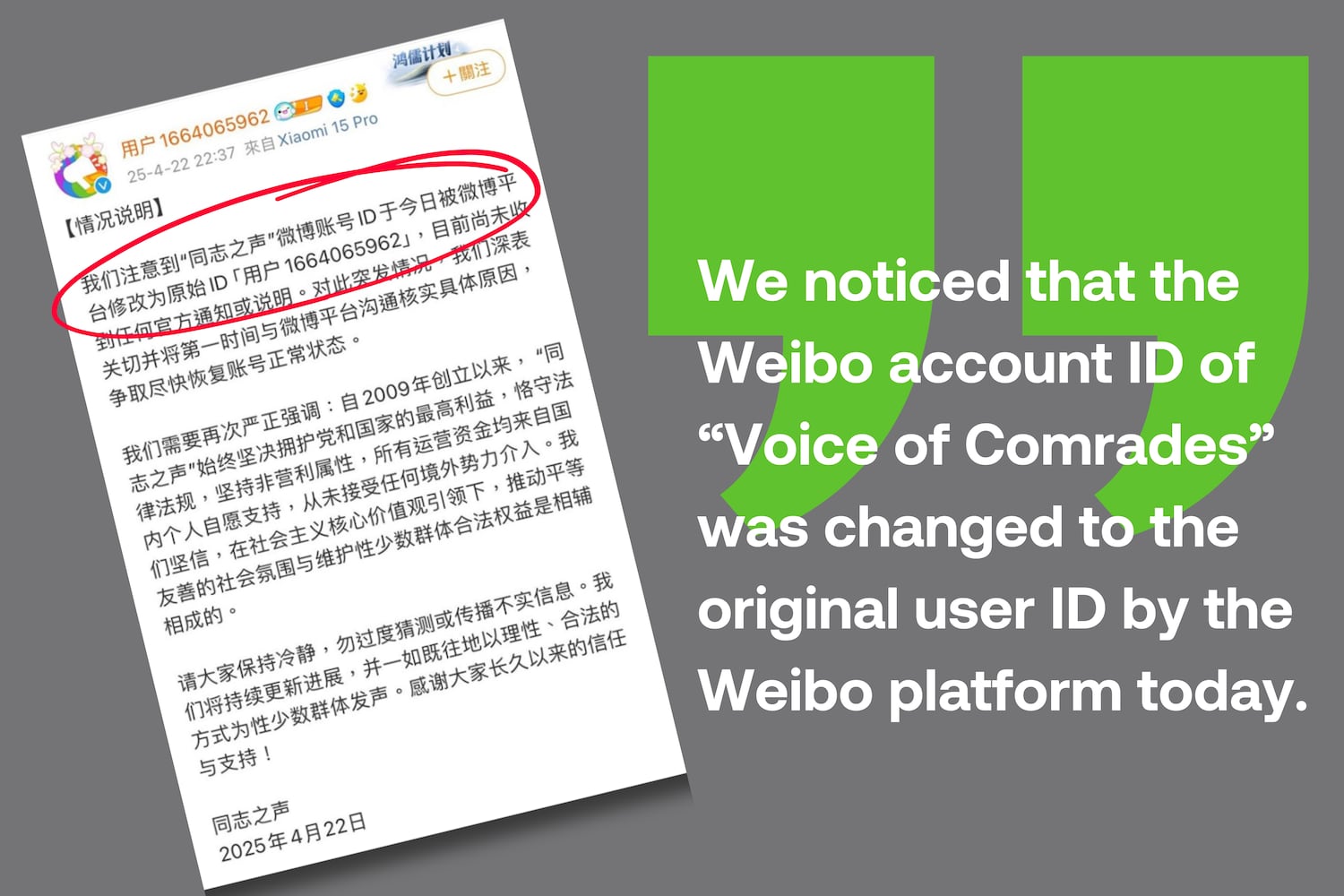
A popular account on Chinese microblogging platform Weibo was forced to change its name from “Voice of Comrade” as the term refers to homosexuality, prompting intense criticism of Chinese regulators, known for censoring content with gay themes.
The word “tongzhi” or “comrade” – widely used by China’s Communist Party to address cadres – has in recent decades been embraced by the country’s gay community to refer to homosexuals in an effort to replace derogatory words that previously defined them.
On Tuesday, the account name “Voice of Comrade” was suddenly deleted and replaced with the original user ID number. A day later, the account name was changed to “Voices of Pride” to be in compliance with the country’s Internet regulations, its moderator said – sparking widespread outrage by Chinese netizens over the apparent censorship.
“The sudden ban on the use of the name can be seen as another example of China’s suppression of human rights,” said human rights activist Pan Jiawei, noting that the Weibo account has served as a valuable source of information for sexual minority groups in China since it was set up in 2009.
“It shows the Chinese government’s discrimination against sexual minorities, and at the same time it allows the outside world to see how the authorities use ridiculous methods to force companies to toe the party line,” Pan told Radio Free Asia.
On Tuesday, the “Voice of Comrade” account on China’s version of X – which boasts two million followers – put out a post expressing concern over the platform’s move to delete the name it has been known by for over 16 years.
But in a separate post on Wednesday, it said that the account name “Voice of Comrades” has been changed to “Voices of Pride” to meet the relevant requirements of the “Internet User Account Information Management Regulations.”
In that post, the moderator also emphasized that the renamed account will abide by Chinese laws and regulations, firmly support the position of the Party and the country, and continue to serve sexual minorities.
Many Chinese netizens questioned why the account had not been renamed to “Voice of Homosexuals.” Still others said the forced name change is reflective of the Chinese government’s discrimination against homosexuals and signals growing restrictions on content about the gay community.
Although the Chinese government has not criminalized homosexuality, in recent years many groups and platforms advocating gender equality have been unable to carry out public activities, said Li Maizi, a Chinese LGBT rights advocate.
The name change shows “…the government wants the voices of sexual equality and sexual minority groups to fade out of Chinese society, which is related to the government’s hostility to Western ideology,” said Li.
“The environment of public opinion is very tight, and if various homosexual art groups want to exist, they have to stay low key. Many organizations have actually changed their names; (for them) at least there is a space for survival,” she added.
In 2012, the Contemporary Chinese Dictionary, regarded one of China’s most authoritative dictionaries, excluded the homosexual definition of the term “comrade.” At the time, the director of the committee entrusted with updating the dictionary said they omitted the term’s gay reference to avoid encouraging its usage.
Homosexuality – illegal in China until the late 1990s – was defined as a mental disorder until that classification was removed in 2001.
“Homosexuality is still a taboo and sensitive word in official circles, so when people use the word “comrade” to refer to homosexuality, the Chinese government is very unhappy with it,” independent commentator Hu Ping who lives in the United States told RFA.
“But I think they cannot reverse it. You can change the name … but ordinary people will still regard ‘comrade’ as a synonym for homosexuality. They will still do that,” Hu said.
In 2018, Weibo had announced plans to censor cartoons, games, and short video content about homosexuality as part of a campaign to “create a healthy and harmonious community environment.” But the company was forced to cancel the plan after it faced a major backlash from users using the hashtag #IAmGay.
Edited by Tenzin Pema and Mat Pennington.
